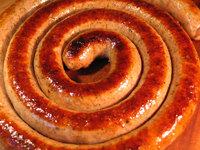The Cumberland sausage wins PGI status

Thanks to a small and dedicated group of Cumbrian Sausage producers the Cumberland Sausage, famous for its long coiled appearance, course texture and distinctive seasoning has been granted Protected Geographical Indication status.
After a six year application process the European Union has finally recognised the regional importance of the Traditional Cumberland Sausage adding it to an elite list of distinguished PGI protected products including Jersey Royal New Potatoes, Melton Mowbray Pork Pies and Stilton Cheese.
PGI legislation was created by the European Union in 1992 to protect the reputation of regional foods. The new legislation will prevent sausages from being sold as Traditional Cumberland Sausage unless they meet strict criteria for meat content, ingredients, production process and place of origin.
Speaking on behalf of the Cumberland Sausage Association, a group of 24 members producing traditional Cumberland sausage farmer Peter Gott said:
“We are absolutely thrilled to have achieved PGI status for the much loved Traditional Cumberland Sausage. Its seen as the signature dish of Cumbria and we are passionate about protecting its long-established reputation. I should add that this achievement is in no small part due to the dedicated work of John Anderson who championed the campaign and who sadly died last year.”
The Traditional Cumberland sausage would originally have been made from the indigenous Cumberland Pig which became extinct in the 1960's The long coiled appearance and coarse texture is believed to date back to the 16th century when it is believed German migrant miners started producing sausages in the style of the long meaty sausages they were used to back home. The seasoning which makes the Cumberland so distinctive is attributed to the influx of exotic spices from the Americas through the Cumbrian port of Whitehaven in the 18th century.
Philip Cranston, Managing Director of Cranstons Quality Butchers, Penrith and a member of the Cumberland Sausage Association explains “Our Cumberland sausage recipe dates back to 1914 when my Great Uncle established the business, it remains our best selling line today. It is much loved by both locals and visitors to the area who take it home in large quantities to stock up their freezers and order it through our website. I am delighted that its regional importance has been recognised protecting it for future generations to enjoy.”
Many different Cumberland recipes exist as up until the 1950's it was common practice for householders to keep a pig as a means of self sufficiency, slaughtering in the Autumn and using the products including Cured Cumberland Sausage, throughout the harsh winter months. Every butcher has their own secret seasoning blend making their product unique. The PGI status will allow for different producers to keep their own distinct recipe whilst ensuring they meet the common features of the Traditional Cumberland Sausage.
Cumberland Sausage Association Members:
Cranstons Quality Butchers, Penrith
Templand Farm, Grange over Sands
Colin Woodall, Waberthwaite
Austen Davies, Border Country Foods
Peter Gott, Sillfield Farm
Cumbrian Fellbred
Steadmans Butchers, Sedburgh
Higginsons Butchers, Grange over Sands
Dawsons Farm Shop, Stainton
Bellas Butchers, Shap
Gordon Clark Butchers, Penrith
Stuart Flett, Workington
Shaw Meats, Wigton
Lakes Speciality Foods, Staveley
Claytons Butchers, Ambleside
G Gordon Butchers, Carlisle
Savin Hill Farm, Lyth Valley.
Huddlestons Butchers, Windermere
Hallsford Farm Produce, Carlisle
Stevensons Quality Farm Meats.
Askerton Castle
Keswick Game and Fine Meats
Eden Farm Bakery
Chromie and Robinson, Carlisle

